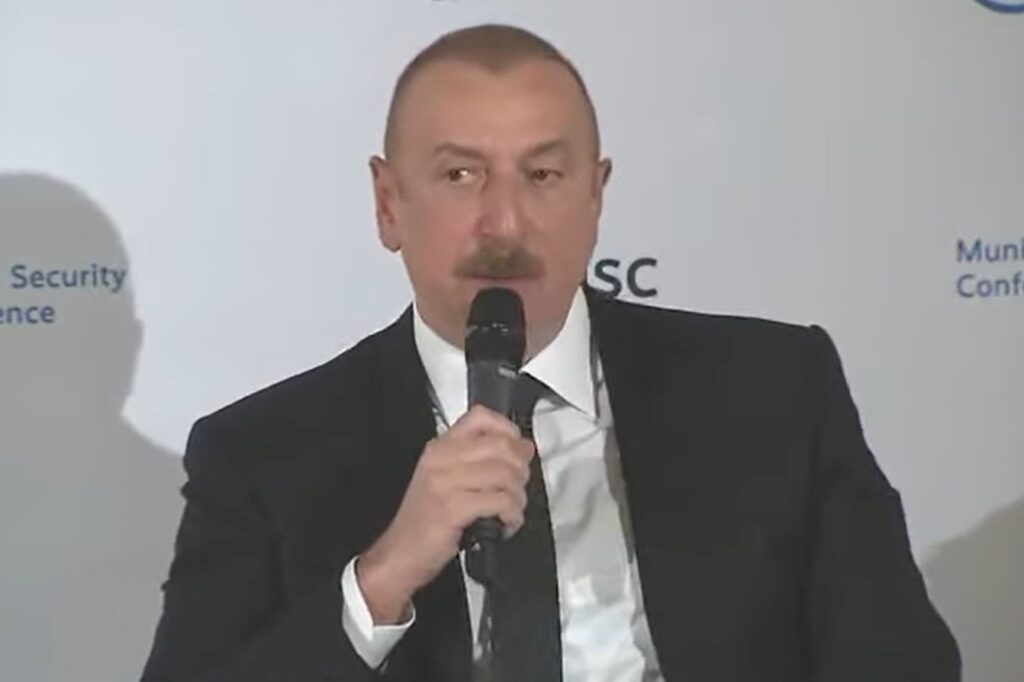Azerbaijan’s President Ilham Aliyev and Armenia’s Prime Minister Nikol Pashinyan took part in a joint panel on Saturday. Aliyev afterwards stressed that any mention of Nagorno-Karabakh’s status in the peace deal with Armenia was ‘unacceptable’.
Aliyev made the statement to journalists after a panel discussion with Armenia’s Prime Minister Nikol Pashinyan and Georgia’s Prime Minister Irakli Gharibashvili at the Munich Security Conference.
Prior to the discussion, Aliyev and Pashinyan met with US Secretary of State Antony Blinken, who reaffirmed Washington’s readiness to mediate a peace agreement between the two countries.
Three key issues remain undecided in Azerbaijan and Armenia’s peace agreement process: the demarcation of borders between the two countries, the opening of transport links, and the rights and security of Nagorno-Karabakh’s Armenian population.
In an interview published by the Azerbaijani presidency, Aliyev stated that Azerbaijan wanted its borders to be ‘delimited based on historical maps’ and that Armenia should ‘give up its territorial claims’ against Azerbaijan.
While Aliyev stated during the debate that Azerbaijan had agreed with international partners to discuss the ‘rights and guarantees’ of Nagorno-Karabakh’s ethnic Armenian population, he went on to state in the interview that Nagorno-Karabakh could not be mentioned in the peace agreement.
He also claimed that Armenia had recently responded to Azerbaijan’s proposals regarding the peace agreement, confirming Armenian claims that they had submitted their own proposals last week.
‘At first glance, there is progress in Armenia's position, but it is not enough’, said Aliyev.
The Azerbaijani president said that he had that day officially proposed the establishment of bilateral checkpoints on the Armenia–Azerbaijan border, including one on the Lachin Corridor, and one on either end of the ‘Zangezur Corridor’.
The Zangezur Corridor is a Baku-proposed road that would connect Azerbaijan to its western exclave of Nakhchivan through Armenian territory.
‘If we are talking about border delimitation, it is impossible without checkpoints’, he said.
Another point of contention between the two countries is the status of Nagorno-Karabakh and its people: last year, Yerevan’s rhetoric appears to have significantly stepped back from previous demands for the region’s autonomy, instead asking for ‘security guarantees’ for its Armenian population.
This shift in tone was met with disapproval by the Armenian opposition and Stepanakert’s leadership, both of whom accused Yerevan of making ‘destructive statements’.
Armen Grigoryan, the Secretary of the Armenian National Security Council, says that the latest version of the peace agreement submitted by Yerevan does include mention of the Nagorno-Karabakh conflict, but noted that the text is ‘not final’.
The Lachin Corridor and Vardanyan
During the panel discussion, Aliyev stated that Azerbaijan agreed with international partners to discuss ‘the rights and guarantees of the Armenian minority in Karabakh’.
‘We are ready to do it but with representatives of the Armenian community who were born in and lived all their lives in Karabakh.’
He alluded to Nagorno-Karabakh’s State Minister Ruben Vardanyan, saying that Baku is not willing to negotiate with ‘the person who was exported from Russia to have the leading position in Karabakh’.
‘Maybe “exported” is not the right word’, he added. ‘I would prefer the expression “smuggled into”’.
Aliyev also denied that Azerbaijan was blockading the Lachin Corridor — the road that connects Nagorno-Karabakh to Armenia — and said that Vardanyan’s alleged visit to Moscow in early February was proof that the region was not under blockade.
‘No one knows how [Vardanyan] ended up in Karabakh and how he’s [able to] go to Yerevan and then to Moscow and then back to Yerevan and then back to Karabakh. This fact alone demonstrates that there is no blockade.’
[Read more on OC Media: Nagorno-Karabakh enters third month of blockade]
Vardanyan has been the subject of Azerbaijani criticism since his appointment in November, with Aliyev and other high-ranking officials in Baku repeatedly demanding his removal from power.
Speaking on the panel with Aliyev, Armenia’s Prime Minister Nikol Pashinyan suggested that the blockade of the Lachin corridor violated the 2020 Nagorno-Karabakh ceasefire agreement, stressing that the Lachin Corridor should be ‘outside’ of Azerbaijani control. The 2020 ceasefire agreement stipulates that the corridor should be under the control of Russian peacekeepers.
The Armenian prime minister also called on the international community to pay close attention to the developments over Lachin corridor, noting that it could have ‘irreversible humanitarian consequences for the Armenians of Nagorno-Karabakh’.




 20 February 2023
20 February 2023



